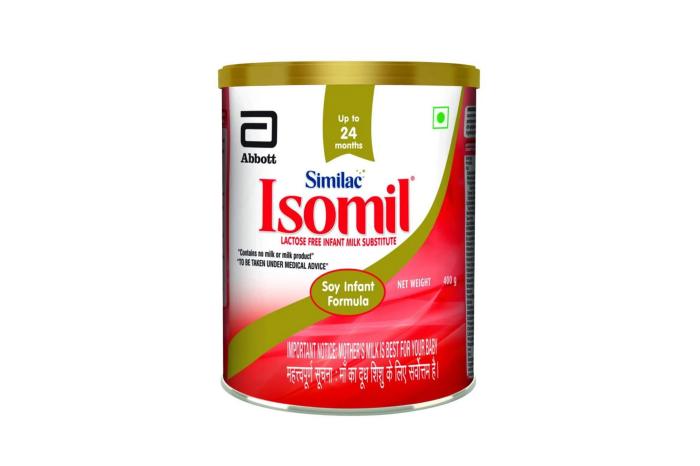Isomil is a specialized infant formula designed for babies who are sensitive to cow’s milk protein. It is a soy-based formula, meaning it is made primarily from soy protein. Parents often choose Isomil for infants who have lactose intolerance or a milk allergy. Understanding what Isomil is, its benefits, and how to use it can help parents make informed choices.
Ingredients in Isomil
Isomil contains soy protein as its main ingredient. This protein is derived from soybeans and is a good alternative for babies who cannot tolerate cow’s milk. Isomil also includes carbohydrates, fats, vitamins, and minerals. These ingredients provide essential nutrients that support healthy growth and development.
In addition to soy protein, Isomil often contains oils for fat content. These oils can include canola oil, palm oil, and coconut oil. The fats in Isomil are important for brain development and energy.
Isomil is fortified with vitamins and minerals to ensure that babies receive a balanced diet. Key nutrients like iron, calcium, and vitamin D are often included. These nutrients play crucial roles in a baby’s growth and health.
Benefits of Isomil
Choosing Isomil has several benefits. First, it is designed for babies with specific dietary needs. If a baby has a milk allergy, Isomil can be a safe alternative. It allows parents to provide essential nutrition without the risk of an allergic reaction.
Second, Isomil is lactose-free. Babies who are lactose intolerant cannot properly digest lactose, which is found in cow’s milk. Isomil provides a suitable option for these infants, allowing them to receive proper nutrition without digestive issues.
Third, Isomil can help with digestion. Some babies experience discomfort or gas when consuming cow’s milk. Since Isomil is soy-based, it can be gentler on the stomach. This can lead to less fussiness and more comfort for the baby.
Choosing the Right Isomil Formula
When selecting Isomil, it is essential to choose the right type for your baby’s needs. Isomil is available in different forms, including powdered and ready-to-feed options.
Powdered Isomil is often more economical and has a longer shelf life. However, it requires preparation by mixing with water. Ready-to-feed Isomil is convenient for on-the-go feeding, as it does not require mixing.
Always read the label carefully to ensure you choose the right product. Some Isomil products are fortified with additional nutrients. This may be beneficial for specific health concerns or dietary needs.
Preparing Isomil
Preparing Isomil is straightforward, but it is essential to follow the instructions on the packaging. Start by washing your hands and cleaning all surfaces to ensure hygiene. Use clean bottles and nipples for feeding.
For powdered Isomil, measure the correct amount of water. Boil the water if necessary and let it cool. Once cooled, add the appropriate amount of powdered formula. Mix thoroughly to ensure there are no clumps.
For ready-to-feed Isomil, simply shake the bottle well and pour the desired amount into a clean bottle.
Always check the temperature of the formula before feeding your baby. It should be warm, not hot.
Storing Isomil
Proper storage of Isomil is crucial to maintain its quality. Unopened cans of powdered formula should be kept in a cool, dry place. Once opened, use powdered Isomil within a month. Store it in an airtight container to keep it fresh.
Ready-to-feed Isomil should also be stored correctly. After opening, it should be refrigerated and used within 48 hours. Always check the expiration date on the packaging before using any formula.
If you prepare formula in advance, store it in the refrigerator. Prepared Isomil should be used within 24 hours. Never leave formula at room temperature for more than two hours.
Common Concerns About Isomil
Parents often have questions about Isomil and its use. One common concern is whether Isomil provides adequate nutrition compared to regular formula. Isomil is formulated to meet the nutritional needs of infants. However, it is essential to consult a pediatrician for personalized advice.
Another concern is the taste. Some babies may not like the taste of soy-based formula initially. It may take time for them to adjust. If your baby refuses Isomil, try offering it at different temperatures or mixing it with other approved foods as they get older.
Some parents worry about potential allergens in Isomil. While Isomil is made from soy, some babies may have soy allergies. Always consult your pediatrician if you have concerns about allergies or dietary needs.
Transitioning to Isomil
If you are transitioning your baby to Isomil, do so gradually. Start by replacing one feeding per day with Isomil. Observe your baby for any signs of intolerance or allergies. If your baby adjusts well, gradually increase the amount of Isomil in their diet.
Monitor your baby’s reaction to Isomil during the transition. Look for signs of discomfort, such as gas, fussiness, or skin rashes. If any concerning symptoms arise, consult your pediatrician immediately.
See also: Are Plastic Sippy Cups Safe
Conclusion
In summary, Isomil is a soy-based infant formula designed for babies with specific dietary needs. It provides essential nutrients while being free from cow’s milk protein and lactose. Understanding what Isomil is, its benefits, and how to use it can help parents make informed choices.
Choosing Isomil can provide a safe and nutritious alternative for infants with milk allergies or lactose intolerance. By carefully selecting the right formula and preparing it correctly, parents can support their baby’s growth and development.
Always consult your pediatrician for personalized guidance on infant nutrition. With careful consideration and support, Isomil can be a valuable option for families.


